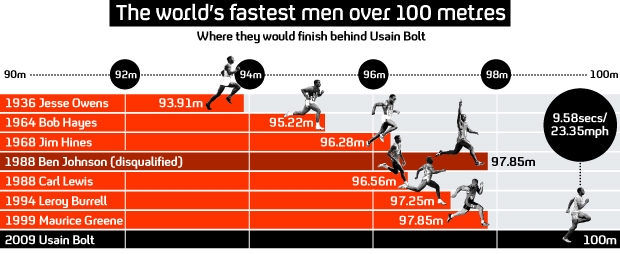‘Lightning’ Bolt leads the field
As Usain Bolt tells Channel 4 News he’s aiming for a new 100m world record of 9.4 seconds at next year’s London Olympics, we look at how the records have tumbled over the last 75 years.

Usain Bolt’s current 100 metres world record of 9.58 secs would have put him two metres ahead of previous record holders. Our graphic shows how successive athletes over the century have out-sprinted one another.
The International Association of Athletics Federations (IAAF) has ratified 65 world records for the men’s 100 metres in the last 100 years.
The most famous of the early record holders was the black American runner Jesse Owens, who achieved immortality by winning the sprint at the Berlin Olympics in August 1936 – to the scarcely-supressed fury of Adolf Hitler, who had been hoping to use the Games to demonstrate the supremacy of the “Aryan race”. Earlier that year Owens had set a new world record for the event of 10.2 secs.
Before the days of electronic timings, records were set to the nearest tenth of a second, with the result that a group of athletes jointly held the record for many years.
So, fast forward to 1964 and the Tokyo Olympics, where another black American – Bob Hayes – had to run in borrowed spikes after losing his running shoes and was given the unfavourable inside lane, which had been churned up by competitors in the 10kms walk the previous day. But those disadvantages did not stop him winning gold in the new world record time of 10.06 secs.
The first man to break the 10 secs barrier was Hayes’s compatriot, Jim Hines, who revelled in the high altitude of the Mexico Olympics four years later to set an official new world record time of 9.95 secs – a record that was to stand for almost 15 years.
Disgraced winner
The Canadian, Ben Johnson, looked to have achieved the next big breakthrough in the event – winning the sprint at the Seoul Olympics in 1988 in a new world record time of 9.79 secs – but the record was to stand for only three days, as he failed a drugs test and was stripped of both the gold and the record.
So it was the man he beat – Carl Lewis – who was recorded as the new Olympic champion and world record-holder, with a time of 9.92 secs.
Lewis’s new rival was fellow American Leroy Burrell, who became the next world record holder, bringing the time down to 9.85 secs at an event in Switzerland in 1994.
The first man legally inside 9.8 secs, was yet another American – Maurice Greene – a five-times world champion who recorded 9.79 secs – finally equalling Johnson’s unratified time – at a meeting in Athens in 1999.
But all of them have been put in the shade by the achievements of the Jamaican, Usain Bolt. The reigning world and Olympic champion, Bolt has set a new world best three times – most famously at the Beijing Olympics in 2008, when he was the first man inside 9.7 secs – and is currently the fastest man in the world with a time he set at the world championships in Berlin in 2009 – 9.58 secs.
He broke his own world record by more than a tenth of a second – the biggest-ever record-breaking margin since electronic timing was introduced in the 1960s. The time would have put him more than two metres ahead of Maurice Greene and the rest of our select field.
And now he says he wants to be the first man to break 9.4 secs at next year’s London Olympics. Can it be done? The figures from the last 75 years suggest that anything is possible.
Dan Pfaff, director of the Lee Valley National Performance Centre, has coached more than 70 athletes – including former Olympic champion and 100m world record holder Donovan Bailey.
-
Latest news
-
‘Government responsiveness should be improved’ says infected blood inquiry chair4m

-
Infected Blood scandal: How UK failed on a global scale4m

-
‘There’s a strong evidential basis’ for ICC to grant arrest warrants for Netanyahu, says criminal law expert4m

-
International Criminal Court prosecutor seeks arrest warrants for Israel PM and Hamas leaders3m

-
‘Highly unlikely there was foul play’ in Iran president helicopter crash, says Tehran professor5m

-




